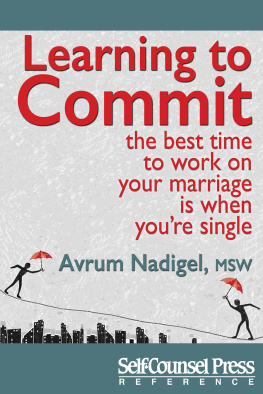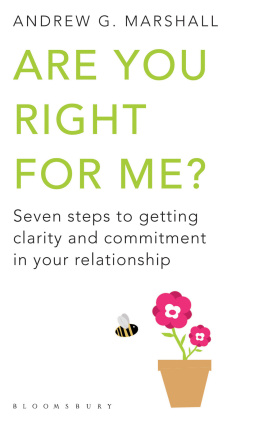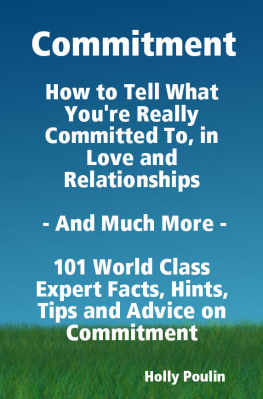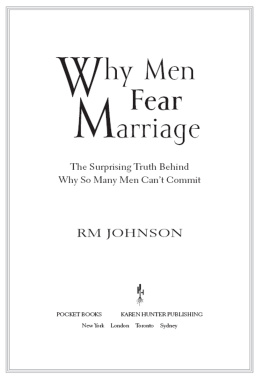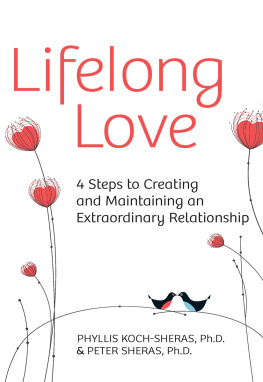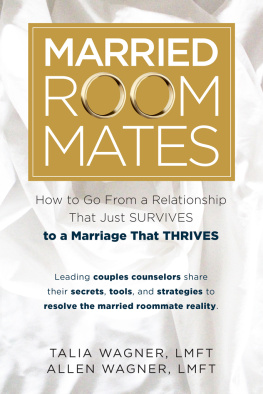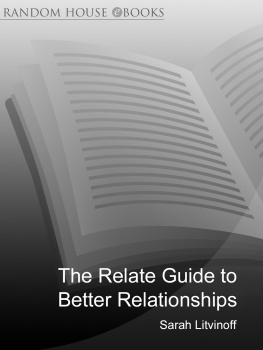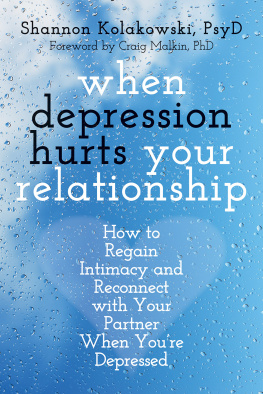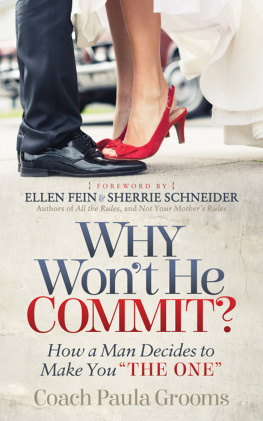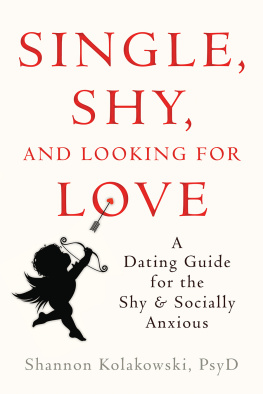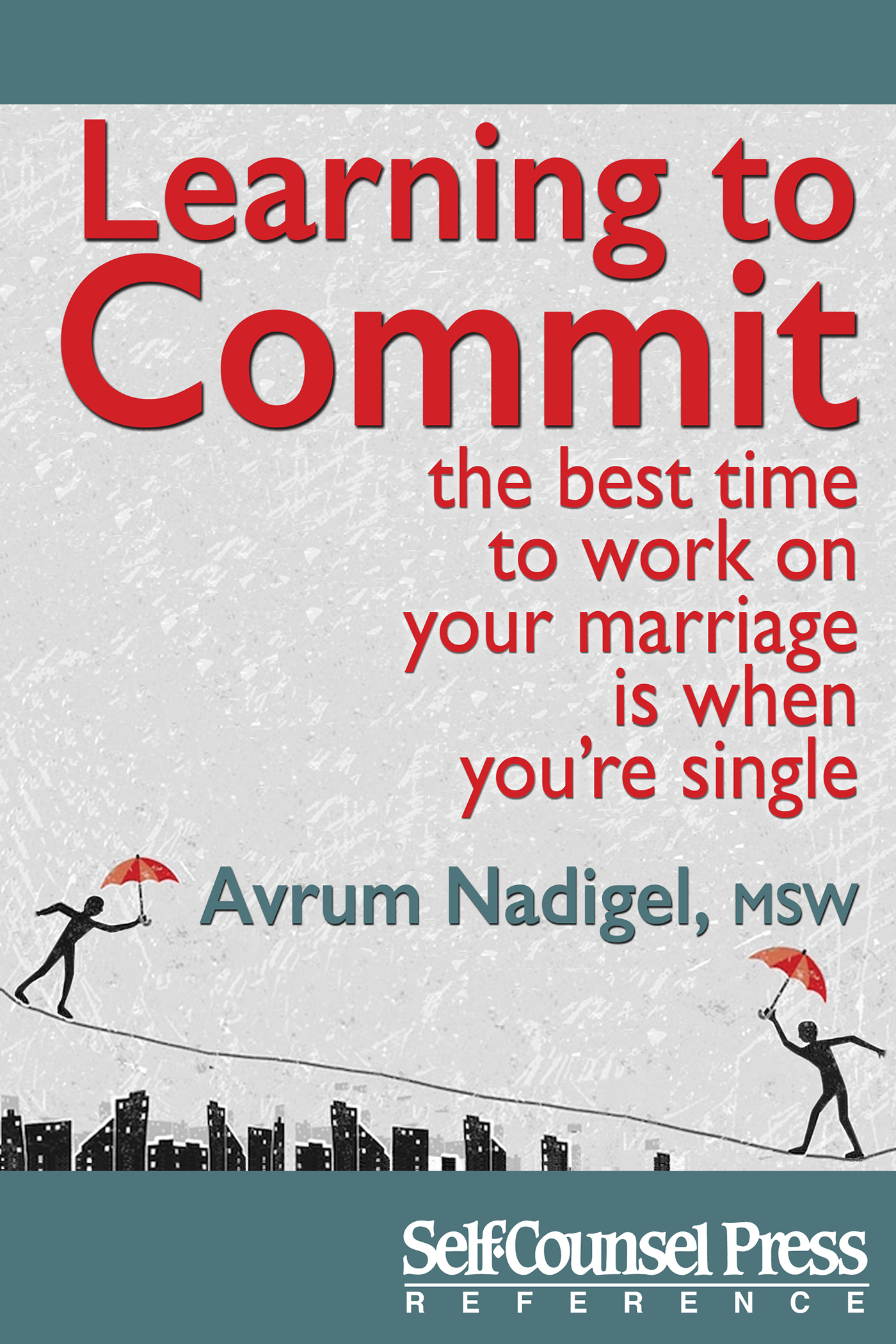Introduction
Why read a book about marriage and commitment written by a self-proclaimed commitment-phobe? Because whatever you happen to be going through when it comes to issues with long-term relationships, you should know right off the bat that this is something Ive struggled with, too.
Of course, you may wonder if you should buy a book with marriage in the title, or in this case, subtitle, at all. Unfortunately, it would be hopelessly awkward to splash the phrase long-term committed relationship on the cover and impossible to capture the nuances of every relationship. Please assume that Im using the term marriage as a catch-all for all of these relationships including yours.
The ideas in this book helped someone who viewed marriage as a death knell, and that someone was me. Thats why Im so eager to share them; as it turns out, sometimes the things we resist the most are actually the things that are the most precious to us.
No, marriage and commitment did not come easily to me, and maybe it doesnt to you, either. If youre anything like the singles and young couples I work with, you probably have varying degrees of cynicism and anxiety about how you will fare in your own marriage. You might ask yourself, Whats the point? That question is the impetus behind this book, and one that I will hopefully have helped you answer by the time youve reached the final chapter. Its a question that haunted me throughout my dating life, and reared its head during the first year of my marriage.
To quote marriage and sex therapist David Schnarch, Marriage is not for the faint of heart. Its not hard to imagine why. The often-quoted 50 percent divorce rate (depending on which study you choose) gives people pause about committing to an institution that produces as many failures as successes. Things dont improve when you consider how poorly so many of the other 50 percent are doing. The end result for many of todays singles is a toxic mix of anxiety and cynicism for anything to do with monogamy. At its most extreme, this fear nourishes promiscuity and commitment-phobia, somewhat glorified by the media and relationship pundits.
There are lots of industries looking to cash in on this behavior, for example, Ashley Madison, a well-known online dating service and infidelity-supporting web community. Many of my young-adult clients wonder if monogamous relationships are social and religious relics from the past. Yet, within a few sessions, cynicism and personal defenses give way to fear, then fear to hope: hope that they might have been wrong to doubt monogamy.
I hope to share with you the things Ive learned about improving relationships our own and others.
This book will be useful for clergy, family mediators, divorce lawyers, parents, and mental health professionals. But most importantly, I believe this knowledge will be useful to you. It certainly saved me from my own inertia and anxiety, and has helped many of my single clients, including some who are getting married as I write this book.
I will do my best to distill this information and make it applicable to your life.
However, I cant promise you top-ten lists or quick fixes. I wont tell you to be more loving, give more hugs, or improve communication. Instead, what I will offer is to guide you towards a better understanding of yourself and the people you love. The work may sometimes be tough, but my guess is youve come to be suspicious of relationship advice thats too easy and doesnt demand anything of you.
With any relationship dilemma or patterned response you find yourself in, you will constantly need to ask yourself, What is my contribution to this?
Youll know youre on the right path when old patterns and reactions start to change. You will get to see what youre made of, and move from living out of reactivity towards a goal-directed life.
One request while you go through this book: Please make sure to bring your independent thinking with you to the material. Try some of the exercises, and wrestle with the ideas, but in the end decide for yourself if this information will benefit you. If not, I encourage you to keep looking until you find something else that will work. I wish you luck and courage on this journey.
Finally, about terminology: I will alternate between the terms marriage, long-term relationships, and committed relationships, but the ideas throughout the book pertain to all of them equally. Also, while most of the examples in this book will be of heterosexual couples, the ideas here are equally relevant to same-sex couples.
Chapter 1
Beginning to Learn
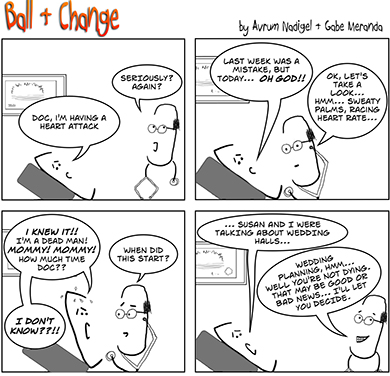
1. My Story: A Fear of Commitment
We teach what we most need to learn.
Richard Bach, Illusions: The Adventures of a Reluctant Messiah
It has only been a decade since I did battle with my own struggles with intimacy and commitment-phobia. In my mid-thirties, and by the time I met the woman who would become my wife, I had a string of relationships, none of which lasted longer than five weeks.
In my late teens and early twenties, my trysts and brief relationships went hand in hand with my indie-rock lifestyle. However, by my late twenties, my friends most of whom were settling down lost interest in hearing about my adventures. In time, I became the punch line of a joke, as told by comedian Chris Rock:
Eventually, every man has to settle down. Cause you dont want to be the old guy in the club. You know what Im talking about, any club you go into theres always one old guy. He aint really old, hes just a little too old to be in the club.
But I didnt settle down then; I just avoided clubs. I also did my best to convince myself that I was doing something about my self-imposed allergy to commitment.
Therapy helped to a degree. However, as the years passed, the sessions started to meander and feel self-indulgent.
I asked my therapist, whom I had already been seeing for two years, how much longer he felt we would need to work together. His answer? Two to three times a week for another three to four years.
The next day, I terminated therapy.
A much cheaper and hopefully quicker option was to check out the self-help and relationship sections of my local bookstore. I pored through pages of relationship advice, mining for any hidden gems that therapy had not provided. Instead, the professionals made one thing clear: People like me were beyond repair, so should be avoided at all costs.
I would end each of these self-therapy sessions feeling weary, hopeless, and painfully alone. Yet I never lost hope. Perhaps it was the years of personal therapy or my own training as a therapist, but I understood the pain was a necessary tool for growth.
It would take several sobering experiences, along with the support of friends, and the passage of time, to help me move beyond a crippling fear of commitment.
Ill discuss these later in this book, but just to look at what these experiences were briefly:
1. My introduction to Bowen family systems theory in a graduate program at McGill University.
2. A defining experience leading a group trip to Israel.
3. Establishing a one-on-one relationship with each of my parents.
4. Overcoming my parents divorce and moving to Vancouver.
5. Meeting Dr. David Freeman, a family therapist who introduced me to some (at first) mind-blowing ideas.
6. Discovering the book Passionate Marriage, by Dr. David Schnarch.

